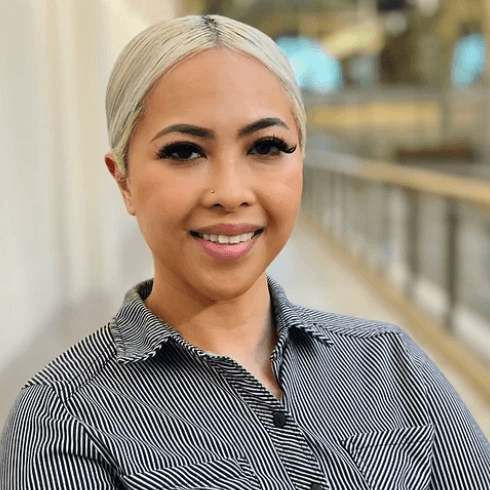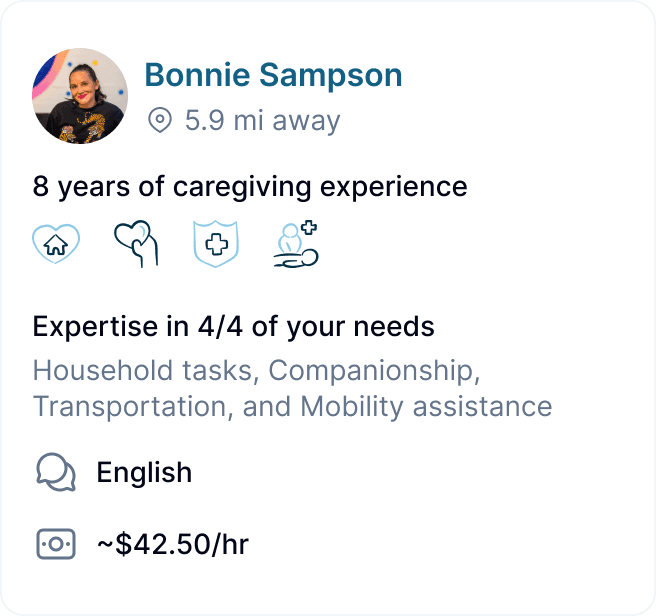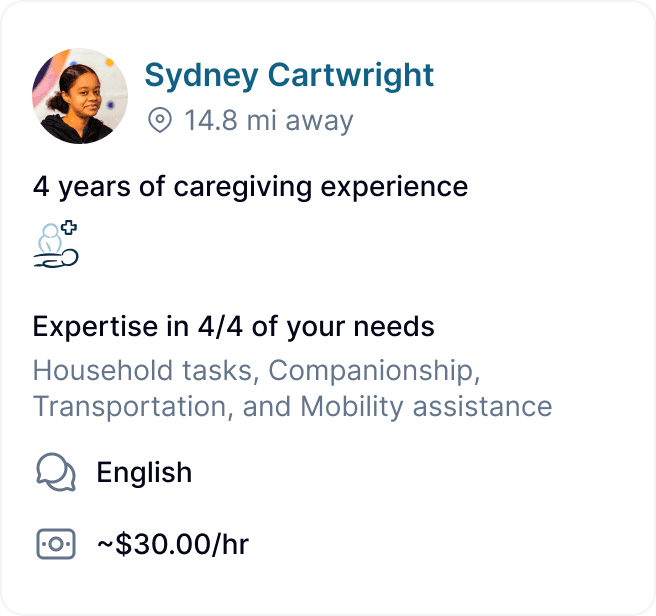4 Signs It Might Be Time To Hire Care For Your Senior Loved One
Dec 19, 2024
Dec 19, 2024



As our loved ones age, maintaining their independence and comfort at home becomes a top priority. However, aging often brings gradual changes that can impact their safety, health, and overall well-being. Recognizing the right time to seek senior care can be challenging, but noticing the signs early can help ensure they receive the support they need while allowing you greater peace of mind.
If you’re wondering whether it’s time to consider professional in-home care, here are four key signs to look out for:
1. Increased Safety Concerns
One of the clearest signs your loved one may need additional care is ongoing concern for their safety. Have they experienced frequent trips or falls, forgotten to turn off appliances, or struggled to navigate stairs or other obstacles in their home? Perhaps you worry constantly that they’ll hurt themselves when no one is around to assist.
Unaddressed safety risks can result in serious injuries. Professional caregivers can provide the necessary support to ensure your loved one stays safe, whether it’s through mobility assistance, fall prevention measures, or help with daily tasks that may have become risky. Be proactive and hire a caregiver “before you really need it”.
2. Difficulty Managing Daily Tasks
If your loved one is struggling to keep up with daily responsibilities, it may be time to step in. Watch for these signs:
Neglected household chores: Dishes piling up, expired food in the fridge, or general disorganization could indicate that managing the home is becoming overwhelming.
Skipping meals or poor nutrition: Are they relying heavily on snacks instead of proper meals?
Inconsistent personal hygiene: If they are neglecting regular bathing, brushing their teeth, or dressing appropriately, this may signal they need additional support.
Professional caregivers can assist with light housekeeping, meal preparation, and personal care to help seniors maintain a clean, healthy, and comfortable living environment. You can read more about the different tasks a caregiver might help with here.
3. Noticeable Changes in Health or Physical Condition
Subtle or sudden changes in your loved one’s health can serve as a red flag. These might include:
Unexplained weight loss or frailty
Increased forgetfulness or missed doctor’s appointments
Difficulty managing medications (e.g., taking the wrong dosage or forgetting entirely)
Chronic health conditions can make it even harder for seniors to manage on their own. Bringing in senior care can help ensure medications are taken properly and doctor’s recommendations are followed, improving overall health outcomes.
4. Isolation or Changes in Mood
Social withdrawal and mood changes are common among aging individuals, especially if they live alone. If your loved one has stopped participating in hobbies, avoids seeing friends, or seems unusually irritable or sad, it may indicate loneliness, depression, or anxiety.
In-home care can provide much-needed companionship and emotional support. Caregivers can engage seniors in conversations, activities, or outings to foster connection and combat feelings of isolation.
Final Thoughts
Recognizing the need for senior care can be emotional and difficult, but it’s also an important step in ensuring your loved one’s safety, happiness, and dignity. If you’ve noticed any of these signs, it might be time to start thinking about your care options. Schedule a call with a Clara Care Expert to discuss how home care might be a good starting point for your loved one.
Professional in-home caregivers can offer personalized support, companionship, and assistance tailored to your loved one’s needs, helping them continue to thrive at home—and giving you the peace of mind you deserve.
As our loved ones age, maintaining their independence and comfort at home becomes a top priority. However, aging often brings gradual changes that can impact their safety, health, and overall well-being. Recognizing the right time to seek senior care can be challenging, but noticing the signs early can help ensure they receive the support they need while allowing you greater peace of mind.
If you’re wondering whether it’s time to consider professional in-home care, here are four key signs to look out for:
1. Increased Safety Concerns
One of the clearest signs your loved one may need additional care is ongoing concern for their safety. Have they experienced frequent trips or falls, forgotten to turn off appliances, or struggled to navigate stairs or other obstacles in their home? Perhaps you worry constantly that they’ll hurt themselves when no one is around to assist.
Unaddressed safety risks can result in serious injuries. Professional caregivers can provide the necessary support to ensure your loved one stays safe, whether it’s through mobility assistance, fall prevention measures, or help with daily tasks that may have become risky. Be proactive and hire a caregiver “before you really need it”.
2. Difficulty Managing Daily Tasks
If your loved one is struggling to keep up with daily responsibilities, it may be time to step in. Watch for these signs:
Neglected household chores: Dishes piling up, expired food in the fridge, or general disorganization could indicate that managing the home is becoming overwhelming.
Skipping meals or poor nutrition: Are they relying heavily on snacks instead of proper meals?
Inconsistent personal hygiene: If they are neglecting regular bathing, brushing their teeth, or dressing appropriately, this may signal they need additional support.
Professional caregivers can assist with light housekeeping, meal preparation, and personal care to help seniors maintain a clean, healthy, and comfortable living environment. You can read more about the different tasks a caregiver might help with here.
3. Noticeable Changes in Health or Physical Condition
Subtle or sudden changes in your loved one’s health can serve as a red flag. These might include:
Unexplained weight loss or frailty
Increased forgetfulness or missed doctor’s appointments
Difficulty managing medications (e.g., taking the wrong dosage or forgetting entirely)
Chronic health conditions can make it even harder for seniors to manage on their own. Bringing in senior care can help ensure medications are taken properly and doctor’s recommendations are followed, improving overall health outcomes.
4. Isolation or Changes in Mood
Social withdrawal and mood changes are common among aging individuals, especially if they live alone. If your loved one has stopped participating in hobbies, avoids seeing friends, or seems unusually irritable or sad, it may indicate loneliness, depression, or anxiety.
In-home care can provide much-needed companionship and emotional support. Caregivers can engage seniors in conversations, activities, or outings to foster connection and combat feelings of isolation.
Final Thoughts
Recognizing the need for senior care can be emotional and difficult, but it’s also an important step in ensuring your loved one’s safety, happiness, and dignity. If you’ve noticed any of these signs, it might be time to start thinking about your care options. Schedule a call with a Clara Care Expert to discuss how home care might be a good starting point for your loved one.
Professional in-home caregivers can offer personalized support, companionship, and assistance tailored to your loved one’s needs, helping them continue to thrive at home—and giving you the peace of mind you deserve.
As our loved ones age, maintaining their independence and comfort at home becomes a top priority. However, aging often brings gradual changes that can impact their safety, health, and overall well-being. Recognizing the right time to seek senior care can be challenging, but noticing the signs early can help ensure they receive the support they need while allowing you greater peace of mind.
If you’re wondering whether it’s time to consider professional in-home care, here are four key signs to look out for:
1. Increased Safety Concerns
One of the clearest signs your loved one may need additional care is ongoing concern for their safety. Have they experienced frequent trips or falls, forgotten to turn off appliances, or struggled to navigate stairs or other obstacles in their home? Perhaps you worry constantly that they’ll hurt themselves when no one is around to assist.
Unaddressed safety risks can result in serious injuries. Professional caregivers can provide the necessary support to ensure your loved one stays safe, whether it’s through mobility assistance, fall prevention measures, or help with daily tasks that may have become risky. Be proactive and hire a caregiver “before you really need it”.
2. Difficulty Managing Daily Tasks
If your loved one is struggling to keep up with daily responsibilities, it may be time to step in. Watch for these signs:
Neglected household chores: Dishes piling up, expired food in the fridge, or general disorganization could indicate that managing the home is becoming overwhelming.
Skipping meals or poor nutrition: Are they relying heavily on snacks instead of proper meals?
Inconsistent personal hygiene: If they are neglecting regular bathing, brushing their teeth, or dressing appropriately, this may signal they need additional support.
Professional caregivers can assist with light housekeeping, meal preparation, and personal care to help seniors maintain a clean, healthy, and comfortable living environment. You can read more about the different tasks a caregiver might help with here.
3. Noticeable Changes in Health or Physical Condition
Subtle or sudden changes in your loved one’s health can serve as a red flag. These might include:
Unexplained weight loss or frailty
Increased forgetfulness or missed doctor’s appointments
Difficulty managing medications (e.g., taking the wrong dosage or forgetting entirely)
Chronic health conditions can make it even harder for seniors to manage on their own. Bringing in senior care can help ensure medications are taken properly and doctor’s recommendations are followed, improving overall health outcomes.
4. Isolation or Changes in Mood
Social withdrawal and mood changes are common among aging individuals, especially if they live alone. If your loved one has stopped participating in hobbies, avoids seeing friends, or seems unusually irritable or sad, it may indicate loneliness, depression, or anxiety.
In-home care can provide much-needed companionship and emotional support. Caregivers can engage seniors in conversations, activities, or outings to foster connection and combat feelings of isolation.
Final Thoughts
Recognizing the need for senior care can be emotional and difficult, but it’s also an important step in ensuring your loved one’s safety, happiness, and dignity. If you’ve noticed any of these signs, it might be time to start thinking about your care options. Schedule a call with a Clara Care Expert to discuss how home care might be a good starting point for your loved one.
Professional in-home caregivers can offer personalized support, companionship, and assistance tailored to your loved one’s needs, helping them continue to thrive at home—and giving you the peace of mind you deserve.
More about finding care
More about finding care


How to Check Senior Caregiver References and What Questions to Ask



Vanessa Bustos


What Is the Average Cost of Nursing Home Care in California?



Jon Levinson


How Do I Find A Reliable Private Caregiver?



Vanessa Bustos


Navigating the Choices: Private In-Home Caregivers vs. Agency Care



Lowrie Hilladakis


Can a Dementia Patient Be Cared for at Home?



Lowrie Hilladakis


The Senior Care Crisis: Strengthening the Caregiving Workfoce



Lowrie Hilladakis


How do I find help for my elderly parent?



Lowrie Hilladakis


What If My Caregiver Isn't The Right Fit?



Jon Levinson


What Are the Differences Between a Personal Care Assistant and a Certified Caregiver?



Vanessa Bustos


How Do I Pick the Best Senior Living Option for My Parents?



Vanessa Bustos
GEt started for free
Better care starts with Clara.
Find, hire, and pay top-notch caregivers without the headache for a price that fits your budget.



GEt started for free
Better care starts with Clara.
Find, hire, and pay top-notch caregivers without the headache for a price that fits your budget.



GEt started for free
Better care starts with Clara.
Find, hire, and pay top-notch caregivers without the headache for a price that fits your budget.

